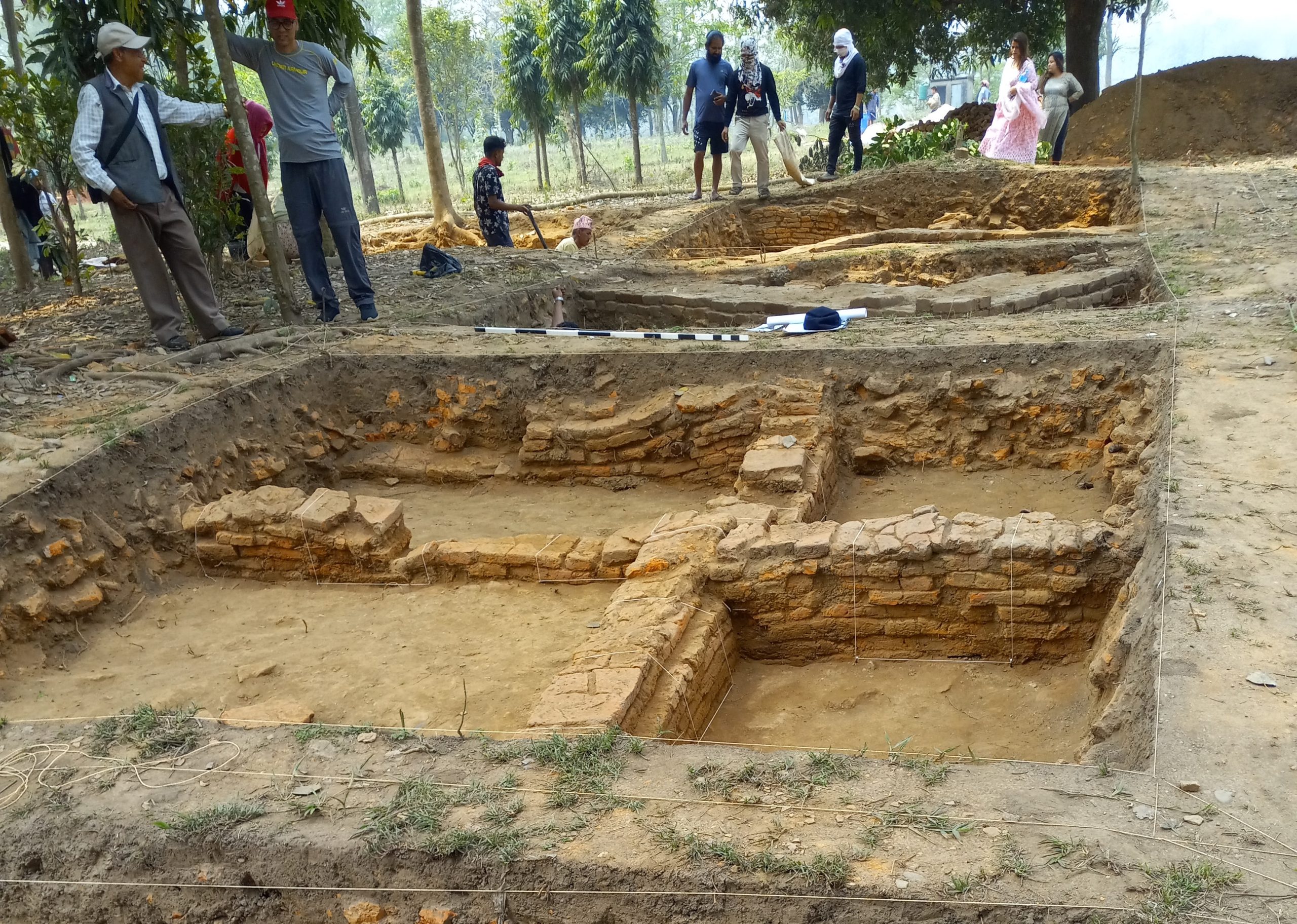प्रचण्डका कारण नेपालले चीनबाट ठूलो अवसर गुमायो : ग्लोबल टाइम्स


बेइजिङ । प्रधानमन्त्री पुष्पकमल दाहाल प्रचण्डका कारण नेपालले चीनबाट ठूलो अवसर गुमाएको चिनिया अखवार ग्लोबल टाइम्सले लेखेको छ । ग्लोबल टाइम्समा भनिएका छ —गएको साता प्रचण्डका नामले समेत चिनिने नेपालका प्रधानमन्त्री पुष्पकमल दाहालले भारत भ्रमणका क्रममा भारतीय समकक्षी नरेन्द्र मोदीसँग हात मिलाए । नेपालबाट प्रकाशित हुने हिमालयन टाइम्सको प्रथम पृष्ठमा छापिएको तस्बिरमा प्रचण्ड संयमतापूर्वक मुस्कुराइरहेका छन् । यसलाई अलग्गै क्षणका रुपमा बुझ्नु हुँदेन । नेपाली मिडियाले लिएका अधिकांश तस्बिरहरुमा प्रचण्डले आँखीभौँ कसेको देखिएको थियो ।
एकताका चीन र नेपाल दुवैतर्फका सर्वसाधारणले प्रचण्डमाथि आशा गाढेका थिए र नगाडुन् पनि कसरी रु उनले पहिलो पटक प्रधानमन्त्रीका रुपमा कुर्सी सम्हालेलत्तै अधिकांश नेपाली नेताले भारत भ्रमण गर्ने परम्पराको अन्त्य गर्दै चीन भ्रमणमा गएका थिए । ठीक आठ वर्षपछि, प्रचण्ड भारतप्रति ‘रुष्ठ’ देखिएनन्, जुन एकताका उनी भएको ठानिन्थ्यो । बरु उनी राजनीतिक आवश्यकताका आधारमा बढी ‘व्यवहारिक’ बनेका छन् ।
यसपालाको भारत यात्राको क्रममा पञ्चेश्वर योजना, भूकम्पपछिको पुनर्निर्माण र पूर्वपश्चिम रेलवे जस्ता मुख्य अजेन्डा उच्च तहको बैठकमा थिए । यद्यपि यी सबैभन्दा महत्वको विषय चाहिँ चीनको ‘एक बेल्ट एक सडक’ योजना अन्तर्गत पर्छन्, जसले नेपाललाई बढी फाइदा दिलाउँथ्यो ।
यस्तो पृष्ठभूमिमा सर्वसाधारणले गर्न सक्ने त केही होइन तर सोध्न चाहिँ सक्छन् कि प्रचण्डले दिल्लीसँग पुनर्मिलन खोजेको हो कि अथवा भारतद्वारा नियन्त्रित नेपालको अवस्थालाई व्यवस्थित गर्न खोजेको हो १
प्रचण्डले मोदीको निमन्त्रणा पाएपछि भारतसँगको द्विपक्षीय सम्बन्धमा एउटा महत्वपूर्ण मोडमा आउँदा के चासो र खतरा देखिएको छ भने नेपालका पूर्व प्रधानमन्त्री खड्गप्रसाद ओलीले काठमाडौँ र बेइजिङबीच सुचारु सम्बन्ध बनाउन गरिएका सहमतिका हस्ताक्षरको मसी सुक्नेबित्तिकै अब ती विस्मृत त हुने होइनन् १ प्रचण्डले यस आशंकालाई निमिट्यान्न पार्न एक जना दूत पठाई ती आशंका निर्मूल पार्ने बाटोबाहेक अर्को बाटो देखिन्न ।
यस्तो लाग्छ, नेपाल र चीनबीचको सम्बन्ध अचानक ठप्प भएको छ र चिनियाँ नेताले कथित रुपमा नेपाल भ्रमण स्थगन गरेको एउटा अभूतपूर्व अवस्था आइपरेको छ ।
चीन र नेपालबीचको द्विपक्षीय सम्बन्ध अचानक नाजुक र संवेदनशील हुन पुगेको देखिन्छ । यस्तो अवस्थामा स्वाभाविक रुपमा चीनले आफूलाई धोका दिइएको महसुस गरेको छ । नयाँ दिल्लीबाट आएको तनाव कम गर्न आवश्यक पर्नेबित्तिकै काठमाडौँलाई बेइजिङ याद आयो, चीनसँग नजिकको सम्बन्ध पनि बनायो र शृंखलाबद्ध महत्वपूर्ण सम्झौता पनि भए जसले भारतसँगको भर र भार कम पार्न नेपाललाई सहयोग हुन सक्थ्यो ।
तर एक पटक काठमाडौँसँगको भारतीय व्यवहार खुकुलिनेबित्तिकै तथा केही वचन दिइनेबित्तिकै नेपाली राजनीतिज्ञहरुले चीनसँगको गाँठो खुकुल्याउन थालिहाले ।
ती राजनीतिज्ञहरुको बेइजिङलाई नयाँ दिल्लीसँगको सन्तुलनको औजारका रुपमा उपयोग गर्ने नियत नहोला तर भारतबाट नेपाललाई दिइने निरन्तरको दबाब, नेपाली राजनीतिज्ञको व्यवहारबादी ‘छोटोदृष्टि’ले बेइजिङ–काठमाडौँको सम्बन्धमा नराम्रोसँग प्रभावित पारिरहेको छ ।
मुलुकको कूटनीति विशुद्ध राष्ट्रिय रुचिका आधारमा मात्रै बनाइयो भने यो दीर्घकालीन हुन सक्तैन किनभने परिपक्व वैदेशिक नीतिका लागि नैतिकता, न्याय र सत्यनिष्ठा पनि चाहिन्छ ।
चीनले कहिल्यै पनि भारत–नेपाल सम्बन्धलाई भाँजो होलेको छैन तर नयाँ दिल्लीले भने निरन्तर चीन–नेपाली सम्बन्धलाई हस्तक्षेप गरिरहन्छ । अब उपरान्त जेसुकै परिप्रेक्ष्य होस्, बेइजिङलाई नेपालले अझै बढी विश्वास दिलाउनु पर्नेछ । चीनलाई भारतसँगको सौदाबाजीको औजारका रुपमा लिनुभन्दा बेइजिङसँग सम्बन्धलाई गम्भीरतापूर्वक गाँस्नु उपयुक्त हुन्छ नत्र त आधारभूत रुपमा नेपालको स्वतन्त्रता र इज्जतका लागि हानिकारक नै हुन्छ ।
नेपाल र भारतबीचको सम्बन्धलाई तुलना गर्ने हो भने पनि जहाँ नेपाल र भारतबीचको सीमामा कुनै सुरक्षाबल र कैयौँ सूचनाका च्यानलहरु छन्, जुन चीनसँगको सम्बन्धमा त्यति दरिलो च्यानल र सुरक्षाबलको द्विपक्षीय सम्बन्ध छैन । यसको अर्थ बेइजिङ र काठमाडौँले यी तीन पक्षबीच सन्तुलन कायम गर्न यस पक्षमा पनि शिघ्रातीशिघ्र विकास गर्नुपर्ने हुन्छ ।
आजको अवस्थामा नेपाललाई अवसरवाद चाहिएको छैन तर बढीभन्दा बढी राजनीतिज्ञको दृष्टिकोण र रणनीति आवश्यक देखिन्छ । यस्ता राजनीतिज्ञले मात्र चीनले अघि बढाइरहेको ‘बिएन्डआर’ अवसरलाई हासिल गर्न सक्छन् र नयाँ दिल्लीसँगको आश्रित भार कम गर्दै नेपालले पूर्णतयाः स्वतन्त्र मुलुकका रुपमा आफूलाई अघि बढाउन सक्छ ।
सन् २००८ मा प्रचण्डले अवसरलाई निकै नजिक ल्याएका थिए र ओलीले सो रणनीतिक सुधारको अवसरलाई विरासतका रुपमा ग्रहण गर्न पुगे । भारतको चर्को दबाबकै कारणले किन नहोस् प्रचण्डले सो प्रक्रियालाई दुर्घटनामा नै पारेका छन् । उनले आफ्नो प्रारम्भिक दृढ सङ्कल्प बिर्सिएका हुन् रु सर्वसाधारणले उनीबाट यसको उत्तर खोजिरहेका छन् ।
तर उत्तर जे सुकै होस्, चीन यसबाट पृथक् नै रहन्छ । चीन–नेपाल सम्बन्धमा काठमाडौँले सधैँ बढी नै पाएको छ, पाउँछ । बेइजिङले केही पनि गुमाउँदैन तर नेपालले चाहिँ चीनसँग गुमाउने चिज धेरै हुन्छ, धेरै अवसर गुमाउँछ ।
Under the spotlight, Nepalese Prime Minister Pushpa Kamal Dahal, who is popularly known as Prachanda, shook hands with his Indian counterpart Narendra Modi during his tour in India last week. Yet in the picture published by The Himalayan Times, Prachanda was smiling cautiously. This is not an isolated moment. In the most photos taken by Nepalese media, Prachanda tends to knit his eyebrows.
People from both China and Nepal once pinned their hope on Prachanda, who has indeed surprised us by breaking the tradition of Nepali leaders visiting India first after taking office. He made China his first stop. Eight years later, Prachanda is no more “furious” as he was once described, but rather has more realistic considerations for political interests.
During his tour in India this time, the Pancheshwar Project, reconstruction after the earthquake and the East-West Railway program are on the agenda of high-level meetings. However, all those are among the core subjects of China’s Belt and Road initiative that can benefit Nepal.
Against such a backdrop, people cannot help but ask whether Prachanda is seeking reconciliation with New Delhi or maintaining Nepal’s status of being controlled by India.
When Prachanda received Modi’s invitation and kick-started a turning point in bilateral ties with India, concerns and warnings made by Nepal’s former prime minister Khadga Prasad Oli over the possibility that agreements signed between Kathmandu and Beijing might not be carried out in a timely manner began to widely spread. Prachanda had no other options except sending an envoy to China to explain.
It seems that the relationship between Nepal and China stalled abruptly, and a visit by Chinese leaders to Nepal has allegedly been suspended – an unprecedented situation.
It looks like the bilateral relationship between China and Nepal has suddenly turned fragile and sensitive. Obviously, China feels tricked. When Kathmandu needed Beijing to relieve pressure from New Delhi, it got close to China and signed a series of crucial agreements with Beijing which would help Nepal get rid of its reliance on India.
But once India’s attitude toward Kathmandu relaxed a bit and the former made some promises to the latter, Nepalese politicians immediately put the nation’s ties with China on the back burner.
Perhaps these politicians have not intended to treat Beijing as a tool to counterbalance New Delhi, but apart from pressure on Nepal from India, Nepalese politicians’ realistic short-sighted motives are also influencing Beijing-Kathmandu relations.
However, if a country’s diplomacy is made purely based on its national interests, it will not last long, because morality, justice and integrity are also needed in mature foreign policies. China has never disturbed India-Nepal relations, but New Delhi has been interfering Sino-Nepalese ties every once in a while. Hence from whatever perspective, Beijing is more deserving of Nepal’s trust.
Taking China as a bargaining chip with India, instead of sincerely developing ties with Beijing, will fundamentally hurt Nepal’s independence and reputation. Compared with relations between India and Nepal, where there is no defense force along the borders and many channels of communication, China’s ties with Nepal are not as nearly as good. That means if Beijing and Kathmandu want to seek a balance between the three parties, the two must develop ties very quickly.
Today’s Nepal does not need opportunism, but more politicians with perspective and strategies. Only such politicians can seize the opportunities offered by China’s “B&R” initiative, figure out a way to become less dependent on New Delhi and turn Nepal into a completely independent country.
Prachanda had once gone very far on this path in 2008 and Oli has inherited this strategic reform. However, under pressure from India, Prachanda is likely to derail the process. Has he forgotten his initial determination? People are waiting for an answer.
But whatever the answer will be, China will stay aloof from it. In the Sino-Nepalese relationship, Kathmandu is the one that always gets more. Beijing will lose nothing, but it is Nepal that needs to consider whether it will miss more opportunities.













